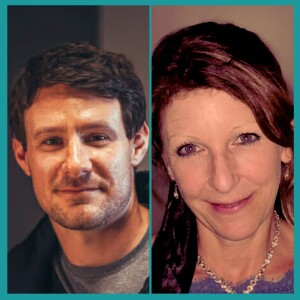
Stories, science and secrets from the world’s brightest thought-leaders. Behavioral Grooves is the podcast that satisfies your curiosity of why we do what we do. Explanations of human behavior that will improve your relationships, your wellbeing, and your organization by helping you find your groove.
Episodes

Sunday Oct 29, 2023
Why Sleep Is Vital for Academic Success | David Creswell PhD
Sunday Oct 29, 2023
Sunday Oct 29, 2023
We all know we need a good night’s sleep but sleep researcher, David Creswell PhD has studied how our performance is actually affected by sleep. He has even found a predictive correlation between student’s college GPA scores and their sleep duration.
David Creswell is a professor of psychology at Carnegie Mellon University and has published numerous studies on mindfulness-based interventions and their impact on well-being. He is a prominent researcher specializing in health psychology, mindfulness meditation, and stress management.
Earlier this year David co-authored a paper in Psychological and Cognitive Sciences called, “Nightly sleep duration predicts grade point average in the first year of college” which caught our attention. The research measures performance metrics among students who wore Fitbits while sleeping. The findings suggest getting less than 6 hours of sleep may be a threshold where sleep shifts from helpful to harmful.
To wrap up the conversation, hosts Kurt and Tim discuss the topic of sleep in their Grooving Session. They discuss their very different sleep patterns and what Kurt has done to help improve his insomnia.
© 2023 Behavioral Grooves
Topics
(4:22) Welcome and speed round questions.
(5:50) David’s research on sleep.
(12:14) What about daytime napping?
(15:42) The difference between sleeping more or less than 6 hours per night.
(17:16) Sleep duration and academic success in college students.
(22:16) How to avoid false positives in research.
(30:09) Does David listen to music while he sleeps?
(33:34) Grooving Session with Kurt and Tim on sleep.
© 2023 Behavioral Grooves
Links
Dr David Creswell PhD: https://www.cmu.edu/dietrich/psychology/directory/core-training-faculty/creswell-david.html
The Health and Human Performance Lab: https://www.healthandhumanperformancelab.com/
Equa App: https://equahealth.io/about-us/
Creswell, et. al. (Jan 2023), “Nightly sleep duration predicts grade point average in the first year of college” Psychological and Cognitive Sciences: https://www.pnas.org/doi/10.1073/pnas.2209123120
Ruchir Sera - Episode 26, Resonea app and the Behavioral Effects of Sleep: https://behavioralgrooves.com/episode/ruchir-sehra-on-the-behavioral-effects-of-sleep/
American Academy of Sleep Medicine: https://aasm.org/
Musical Links
Taylor Swift “Anti-Hero”: https://www.youtube.com/watch?v=b1kbLwvqugk
Don Ho “Tiny Bubbles”: https://www.youtube.com/watch?v=muEFD_odvUg
The Beatles “Yer Blues” from The White Album: https://www.youtube.com/watch?v=JeFwaWFTGYU

Sunday Oct 22, 2023
Bridging Behavioral Science Concepts and Applications | Connor Joyce
Sunday Oct 22, 2023
Sunday Oct 22, 2023
Connect behavioral science theory and research to practical applications. Connor Joyce founded the Applied Behavioral Science Association and he shares his perspectives on different behavioral science roles.
This podcast episode features Connor Joyce discussing his career journey and involvement with the Applied Behavioral Science Association (ABSA). Connor began his career as a human capital analyst at Deloitte, where he was first exposed to behavioral science. He then earned a Master's degree in behavioral science from the University of Pennsylvania.
After graduating, Connor struggled to find career paths for applied behavioral scientists. He started the Behavioral Insights Professional Society to address this issue and connect resources. While it had initial success, Connor realized he lacked strategic experience. He then partnered with the Behavioral Science & Policy Association and others to form Project Nexus, which eventually became ABSA.
ABSA aims to improve the world by promoting education and collaboration across expertise levels in behavioral science. Connor described two main categories - experts who specialize in behavioral science applications, and novices/users who incorporate behavioral science into other roles like design or marketing. ABSA provides resources like standards and job descriptions to support both groups.
The conversation also explores similarities and differences between behavioral science, user experience design, data science, and marketing insights. Connor noted blurring lines between these fields in technology companies, where they are all forms of applied research. Finally, Connor discusses how generative AI could democratize user research by empowering more people to conduct basic studies.
© 2023 Behavioral Grooves
Topics
(3:47) Welcome and speed round questions.
(9:21) What exactly is behavioral science?
(15:45) Creating a professional society for behavioral insights.
(25:09) Behavioral science, user design, and data science.
(33:25) Connor’s musical preferences.
(40:08) Grooving Session with Kurt and Tim.
© 2023 Behavioral Grooves
Links
Connor Joyce: https://www.connectconnor.com/
Applied Behavioral Science Association (ABSA): https://www.behavioralscience.org/
Behavioral Design Hub: https://medium.com/behavior-design-hub/behavioral-science-as-a-specialization-ea64aeb015f7
IIEX North America: https://events.greenbook.org/iiex-north-america
GAABS: https://gaabs.org/
Diversifi: https://www.diversifiglobal.com/
Musical Links
Alesso “Words”: https://www.youtube.com/watch?v=zIJEOEZdLzE
Tiesto “Lay Low”: https://www.youtube.com/watch?v=EfWmWlW2PvM
![The 5 Healthy Brain Habits Of A Neuroscientist | Dr Daniel Almeida [Republish]](https://pbcdn1.podbean.com/imglogo/ep-logo/pbblog2137480/Daniel_Almeida_on_Behavioral_Grooves_podcast6lkzv_300x300.jpg)
Sunday Oct 15, 2023
Sunday Oct 15, 2023
What life habits keep our brain healthy? How does our mind respond to trauma? And why does the way we talk about suicide and mental health make such a difference to those who are struggling? We discuss all these topics with neuroscience researcher Dr Daniel Almeida.
World Mental Health Day has recently shed a spotlight on our psychological wellbeing. So we decided to republish the sound mental health advice we learnt from our guest Dr Daniel Almeida from episode 255 in October 2021.
Daniel has been named one of Forbes 30 under 30 in science. His incredible work as a neuroscience researcher in the Douglas Research Centre at McGill University in Montreal, Canada, involves psychological autopsies to understand the molecular impacts of severe childhood abuse on the brains of individuals who died by suicide.
As you can imagine, this episode is full of difficult yet important topics. But what struck us most about Daniel was how upbeat and positive he is about his work and the difference it’s making to people’s lives. Daniel kindly shares his top 5 healthy brain habits that we can all adopt to improve our mental wellbeing.
If you, or someone you know needs help with their mental health, please use one of the resources in the links below.
Mental Health Support
Suicide Prevention Lifeline (US):https://suicidepreventionlifeline.org/
American Foundation for Suicide Prevention: https://afsp.org/suicide-prevention-resources
Substance Abuse and Mental Health Services Administration: National Helpline (US): 1-800-662-HELP (4357). SAMHSA’s National Helpline is a free, confidential, 24/7, 365-day-a-year treatment referral and information service (in English and Spanish) for individuals and families facing mental and/or substance use disorders. https://www.samhsa.gov/find-help/national-helpline
The Canada Suicide Prevention Service: https://www.crisisservicescanada.ca/en/
Samaritans (UK): https://www.samaritans.org/
United for Global Mental Health (List of support networks around the world): https://unitedgmh.org/mental-health-support
For those looking for information on how to support others:
National Institute of Mental Health: https://www.nimh.nih.gov/health/topics/suicide-prevention
For the general public looking to be trained in mental health first aid and/or suicide prevention:
Living Works (US): https://bit.ly/3oKgsaS
Mental Health First Aid Canada: https://mhfa.ca/
Topics
(6:29) Speed round.
(10:14) Does talking about suicide help?
(14:15) Why it’s very important to talk about “dying by suicide” instead of “committing suicide”.
(16:17) About Daniel’s work as a neuroscientist.
(17:47) What are the links between childhood trauma and suicide?
(25:16) What age are children most sensitive to the effects of trauma?
(31:19) How the type of trauma experienced by a child matters.
(33:36) How resilience is more like a sword than a shield.
(35:29) What are the 5 best brain health habits?
(41:57) What is a brain bank and how are psychological autopsies used?
(44:30) What music isn’t noise pollution for Daniel?
(46:24) Music and the brain.
(48:13) Grooving Session with Kurt and Tim; how to apply Daniel’s work to your life.
© 2023 Behavioral Grooves
Links
World Mental Health Day: https://www.who.int/campaigns/world-mental-health-day
Leading Human™ Workbook and Playbook: https://www.behavioralgrooves-store.com/products/copy-of-the-leading-human-playbook-workbook-package
Leading Human™, Free Whitepaper Download: https://www.behavioralgrooves-store.com/collections/leading-human/products/human-centered-workplace-checklist
Episode 220: How Do You Become Influential? Jon Levy Reveals His Surprising Secrets: https://behavioralgrooves.com/episode/how-to-be-influential-jon-levy/
Dr Brenda Mildner – Mother of Psychological worked on bilateral hypocantim removal: https://www.mcgill.ca/neuro/about/brenda-milner
Donald Hebb: https://can-acn.org/donald-olding-hebb/#:~:text=Donald%20Hebb%20(1904%2D1985),which%20was%20published%20in%201949.
“Molecular impacts of childhood abuse on the human brain” Ibrahim, P.; Almeida, D.; Nagy, C.; Turecki, G. (2021): https://www.sciencedirect.com/science/article/pii/S2352289521000515?via%3Dihub
“A Slice of the Suicidal Brain: What Have Postmortem Molecular Studies Taught Us?” Almeida, D. and Turecki, G. (2016): https://pubmed.ncbi.nlm.nih.gov/27671915/
“What Happened to You?: Conversations on Trauma, Resilience, and Healing”, by Oprah Winfrey and Bruce Perry: https://amzn.to/3lF7EQ7
Brain structure of dancers and musicians https://www.falishakarpati.com/bio
Support Behavioral Grooves by donating on Patreon: https://www.patreon.com/behavioralgrooves
Musical Links
Gladys Knight & The Pips “Midnight Train to Georgia”: https://www.youtube.com/watch?v=A0F9lh8TiSM&ab_channel=GladysKnightTPVEVO
Whitney Houston “I Will Always Love You”: https://www.youtube.com/watch?v=3JWTaaS7LdU
The Supremes “Where Did Our Love Go”: https://www.youtube.com/watch?v=qTBmgAOO0Nw
Stevie Wonder “As”: https://www.youtube.com/watch?v=GYQfWJNWe3I
Marconi Union - Weightless Playlist: https://www.youtube.com/watch?v=qYnA9wWFHLI&t=6831s

Monday Oct 09, 2023
Monday Oct 09, 2023
Why is work so difficult for so many of us? Why are we not connected to the organization in ways to help us advance our careers and garner the best assignments?
Dr. Michelle P. King is a researcher and author who answers these questions and more. She joined us to discuss strategies from her book, “How Work Works: The Subtle Science of Getting Ahead Without Losing Yourself.”
Michelle is a globally recognized expert on inequality and organizational culture. Based on over a decade’s worth of research, She believes that we need to learn how workplaces work, so we can make them work for everyone.
She is the host of a popular podcast called The Fix. “How Work Works: The Subtle Science of Getting Ahead Without Losing Yourself,” is her second book and will be released internationally on October 10, 2023.
Most importantly, in this episode, we talk about the importance of self-awareness, learning how to read the air, and the creation of informal networks to positively influence your career. We also discuss ways to find a sense of belonging and inclusion that can lead to greater satisfaction at work and a better career.
And in our grooving session, we emphasize how increasing your self-awareness can be beneficial to you at any time during your career. During our music discussion, we cover the importance of Leonard Cohen’s mastery of lyrics as a poet and the wealth of great music that comes from the jazz tradition.
Topics
(8:39) Career advancement and informal networking in the workplace.
(11:19) Informal networks at work and their impact on job placement.
(17:37) Workplace dynamics and collaboration.
(24:18) Self-awareness and informal communication in the workplace.
(27:17) Self-awareness, ambiguity, and workplace performance.
(33:22) Workplace communication and social skills.
(36:42) Workplace belonging, diversity, and inclusion.
(42:22) Workplace meaning and career advancement.
(47:17) Setting sails for life and work.
(51:58) Reading the air in workplace communication.
(1:00:40) The potential consequences of asking for things.
(1:01:56) Emotional intelligence in the workplace.
© 2023 Behavioral Grooves
Musical Links
Leonard Cohen “Bird on A Wire”: https://www.youtube.com/watch?v=BGvwvxA83Cs
Oscar Peterson (1976) improvisational piano: https://www.youtube.com/watch?v=lBP3Il85bYA

Monday Oct 02, 2023
Monday Oct 02, 2023
“Do what you love and you’ll never work a day in your life.” Are you tired of that ditty? We are. How are you supposed to know what you love if we don’t 100% know who we are?
“Know thyself” is a maxim that has been central to Western civilization for the last 2500 years. It has been pervasive in philosophy over the ages and more recently in psychology. Who are we? Who am I? These questions blend nicely with understanding why we do what we do, a foundational question in behavioral science. And it is with this curiosity that cohosts Kurt Nelson, PhD and Tim Houlihan delve into the mysteries of who we think we are.
More importantly, this episode is interested in honest self-discovery: the answer to the question: who am I? To help you answer that, we humbly submit a series of questions and reflections for your consideration, for the purpose of having a clearer sense of who I am. (At least at the moment.)
We use three sets of reflections for you to consider:
- Identify where in your life you find energy, joy, and satisfaction. These questions and reflections allow us to target the ideals and desires we have in our lives. These are enhancers.
- Identify what aspects of our lives are not going the way we want them to. These questions help us clarify what is not working for us. These are detractors.
- Identify what requirements we have to live in this world. In others, what obligations, relationships, and financial requirements, among other things, are commitments we must live by? These are necessities.
We also talk about the nature of memories, the present moment, and ways our future aspirations influence who we are. We even discuss Dr. Bryan Lowery’s idea that who we are is largely influenced by the people around us. (Talk about mind-bending!)
By reflecting on these questions and our general discussion, we hope that Groovers can discover a clearer picture of who you are and that these reflections will lead you to a more perfect version of knowing thyself, as Socrates might say.
© 2023 Behavioral Grooves, LLC
Links
Behavioral Grooves Website: www.behavioralgrooves.com
Ethan Hawke TED Talk: https://www.ted.com/talks/ethan_hawke_give_yourself_permission_to_be_creative?language=en
Bhagavad Gita: https://en.wikipedia.org/wiki/Bhagavad_Gita
Hal Hershfield Episode 369: https://behavioralgrooves.com/episode/your-future-self-hal-hershfield/
Brené Brown: https://brenebrown.com/
Brian Lowery Episode 312: https://behavioralgrooves.com/episode/meaning-in-life-brian-lowery/
Self-Serving Bias: https://en.wikipedia.org/wiki/Self-serving_bias
Fundamental Attribution Error: https://en.wikipedia.org/wiki/Fundamental_attribution_error
Motivated Reasoning: https://en.wikipedia.org/wiki/Motivated_reasoning
Confirmation Bias: https://en.wikipedia.org/wiki/Confirmation_bias
Intention-Action Gap: https://thedecisionlab.com/reference-guide/psychology/intention-action-gap
Know Thyself Questions:
Finding Energy and Satisfaction Questions (Enhancers: What You Love To Do)
- What activities or experiences make me feel the most fulfilled and content?
- When do I feel the most authentic and genuine?
- What aspects of life are non-negotiable for me?
- What principles am I unwilling to compromise?
- What kind of person do I want to be remembered?
- What causes or issues do I feel most passionate about?
- What qualities do I admire most in others?
- What decisions or situations have made me feel proud or satisfied with myself?
- What kind of person do I want to be remembered as?
Avoiding Negative Emotion Questions (Detractors: What You Hate To Do)
- What has been my lowest point in the past 5 years?
- What situations or people drain my energy and leave me feeling exhausted?
- What triggers my negative emotions such as anger, sadness, or anxiety?
- Where do I feel regret for things I’ve done or for things I haven’t done?
- What do I stress over the most?
- What negative self-talk or inner critic do I struggle with?
- What are some common sources of conflict or tension in my relationships?
- What do I fear?
- What decisions or situations have made me feel guilty or uncomfortable?
Living in this World Questions (Necessities: What You Have To Do)
- Am I honoring your relationship?
- Do I have what I need to provide for my basic necessities?
- Where do I compromise to ensure that I have positive relationships?
- Am I being responsible?
- Am I honoring my commitments to others, to my job, and to other aspects of my life?
- What are the pressures that the world places upon me?
Your responses and reflections should be as honest and truthful as possible. Try your best to not be tainted by your biases. A clearer picture will help you identify the key areas that drive you.
Examine your self through the lens of what you love to do, what you hate to do, and what you have to do.
Write out a 7-word value statement that defines who you are at the core.
Topics
(0:07) Understanding “Know Thyself” through history.
(5:00) Personal growth throughout history.
(11:28) Understanding one's true identity.
(19:33) Understanding one's biases.
(25:03) Self-awareness and personal growth.
(31:50) Finding your groove.
© 2023 Behavioral Grooves, LLC

Sunday Sep 24, 2023
Why You Never Feel Good Enough As A Perfectionist | Thomas Curran
Sunday Sep 24, 2023
Sunday Sep 24, 2023
Conscientiousness, perseverance and meticulousness are all words associated with perfectionism. But perfectionism comes from a deeper sense of inadequacy, of not feeling good enough. Constantly striving to prove yourself leads to anxiety, depression and burnout. Researcher Thomas Curran describes perfectionism in detail, why it’s getting worse and what we can do about it.
Thomas Curran is a professor of psychology and behavioral science at the esteemed London School of Economics and author of The Perfection Trap: Embracing the Power of Good Enough, just released on August 8, 2023. In the book he explores the roots of perfectionism in wider society and explains how it affects our mental health and productivity.
Perfectionism has risen sharply since the mid-2000s, which Thomas attributes to societal pressures like social media, smartphones, economic instability, and an emphasis on educational and career achievement. Collectively, these factors have led to increased feelings of not measuring up. Thomas argues that perfectionism is as much a cultural issue as a personal one, influenced by an economic model that demands constant growth and consumption.
Topics
(5:18) Welcome to Thomas Curran.
(7:30) What exactly is perfectionism?
(9:46) How growing the economy feeds into perfectionism.
(13:38) The hustle of “successful” people and why we need to look beyond it.
(17:47) How perfectionism can sabotage your own success.
(21:10) What parents can do to help minimize perfectionism in their children.
(24:05) How we can be encumbered with a growth mindset.
(26:01) The 3 types of perfectionism.
(27:50) Does perfectionism self correct with age?
(29:58) Why perfectionism has risen since 2007.
(38:56) How society could change to minimize perfectionism.
(47:52) What music would Thomas take to a desert island?
(51:54) Grooving Session with Kurt and Tim on perfectionism.
© 2023 Behavioral Grooves
Links
The Perfection Trap: Embracing the Power of Good Enough: https://amzn.to/3RtWGP5
Thomas Curran: https://www.thomascurran.co.uk/
Episode 301, How To Fix Burnout (Hint: It Isn’t Another Yoga Session) with Jennifer Moss: https://behavioralgrooves.com/episode/how-to-fix-burnout-jennifer-moss/
Behavioral Grooves Patreon: https://www.patreon.com/behavioralgrooves
Musical Links
Joy Division “Love will tear us apart”: https://www.youtube.com/watch?v=zuuObGsB0No
Bruno Mars “That’s what I like”: https://www.youtube.com/watch?v=PMivT7MJ41M

Sunday Sep 17, 2023
Overcome Chronic Busyness With A Growth Mindset | Eduardo Briceño
Sunday Sep 17, 2023
Sunday Sep 17, 2023
Doing, doing, doing. We can get stuck in a perpetual state of busyness to get things done. But being in a chronic “performance zone” can lead to stagnation over time. The “learning zone”, however, is when we take a step back to reflect on our experiences and look for ways to improve. That’s where a growth mindset comes in - actually believing that we can get better.
“In order to engage in learning, we need to believe that we can improve, we also need to understand how to improve and we need to have a reason or reason that we care to put in the effort to improve.” ~ Eduardo Briceño, Episode 374
Eduardo Briceño is a global keynote speaker, facilitator, and author who guides many of the world’s leading companies in developing cultures of learning and high performance. His TED Talks have been viewed over 9 million times. Alongside Carol Dweck, the leading growth mindset researcher, Eduardo has founded Mindset Works, an organization dedicated to fostering lifelong learning.
On this episode of Behavioral Grooves, hosts Kurt and Tim talk to Eduardo about his new book “The Performance Paradox: Turning the Power of Mindset into Action” which is a practical guide on how to spend more of your time in the learning zone, instead of just the performance zone.
Eduardo provides tips for leaders to create a culture of learning, such as framing core values, identifying habits and systems to support both performance and learning, and modeling learning behaviors visibly.
To Tim’s delight, the conversation with Eduardo uses musical examples from Beyoncé and Dave Grohl to highlight the importance of practice and reflection. Overall, the discussion provides insights on overcoming barriers to a learning mindset and finding a balance between performance and growth in the workplace.
Topics
(4:09) Welcome and speed round questions.
(7:16) If we focus only on performance, our performance suffers.
(10:19) How to tell if you’re in the learning zone or performance zone.
(20:14) How can leaders create a learning culture in the workplace?
(24:04) The performance zone isn’t necessarily a bad place to be.
(25:44) What can Beyoncé teach us about the learning zone?
(27:07) How can we get better at reflecting on our own performance?
(31:02) Overcoming resistance to learning at work.
(33:49) What we can learn from Dave Grohl’s pandemic drum battle.
(38:07) Be deliberate about improvement, not just working harder.
(41:47) What musical artists would Eduardo Briceño take to a desert island?
(43:38) Grooving Session with Kurt and Tim on the learning zone.
© 2023 Behavioral Grooves
Links
Eduardo Briceño’s book, “The Performance Paradox: Turning the Power of Mindset into Action”: https://amzn.to/487Ikd8
Eduardo Briceño: https://briceno.com/
Carol Dweck, Mindset: The New Psychology of Success: https://amzn.to/468cVpg
Anders Ericsson, “The Making of an Expert”: https://hbr.org/2007/07/the-making-of-an-expert
Gordon McKenzie's “Orbiting the Giant Hairball: A Corporate Fool's Guide to Surviving with Grace’: https://amzn.to/44VMi5I
Satya Nadella's efforts to shift Microsoft's culture to focus more on learning when he became CEO: https://timesofindia.indiatimes.com/life-style/books/features/how-microsoft-ceo-satya-nadella-transformed-one-of-the-worlds-great-businesses/articleshow/94221616.cms
Dave Grohl's vs Nandi Bushell drum battle: https://www.youtube.com/watch?v=OZBQW2gE0Ew
Introduction to Experiential Learning, John Dewey: https://learning.northeastern.edu/introduction-to-experiential-learning/
Behavioral Grooves Patreon: https://www.patreon.com/behavioralgrooves
Musical Links
The Beatles “Here, There and Everywhere”: https://www.youtube.com/watch?v=FusIKjztap8
Brian Eno “Garden of Stars”: https://www.youtube.com/watch?v=jlJDUcdUz8c

Sunday Sep 10, 2023
Sunday Sep 10, 2023
Volunteering improves psychological well-being. Team Rubicon has researched this positive effect, not just on the communities it serves, but also on the well-being of its 170,000 volunteers. The organization applies military expertise and speed to provide fast response and social support to those who have suffered a disaster. We learn from David Burke and Patti Norberg about the many benefits they have found with volunteering.
David Burke is the Chief Program Officer at Team Rubicon, an organization that was founded by US armed forces veterans in 2010 with the purpose of voluntarily joining together to work on missions in the aid of regular citizens who are suffering because of natural disasters. Patti Norberg PhD is a Professor of Marketing at Quinnipiac University in Connecticut, and also a good friend of Tim Houlihan.
Team Rubicon is a veteran led humanitarian organization that serves people before, during and after disasters and crises. It’s a movement of thousands of people that work domestically and internationally from mitigating the effects of fires, floods and natural disasters. They are instrumental in missions to rebuild people's homes, surge medical capacity and provide clean water.
From the offset, the purpose of Team Rubicon was not just to help disaster survivors, but also to support veterans' well-being after leaving the military. And Team Rubicon goes one step further by actually researching the effects on well-being and mental health. Kurt and Tim discuss the findings from this research and how it is shaping the ongoing work of Team Rubicon.
Topics
(4:37) Welcome and speed round questions.
(6:56) What is Team Rubicon?
(8:53) How does a military background help Team Rubicon volunteers?
(11:01) What makes Team Rubicon different from other volunteer organizations?
(18:00) How Team Rubicon takes care of the mental health of its volunteers.
(21:33) The social connection that comes from volunteering.
(28:36) How volunteering helps make you feel significant.
(31:47) The next studies on psychological well-being with Team Rubicon.
(35:19) What’s next for Team Rubicon?
(39:31) Grooving Session with Kurt and Tim on volunteering.
© 2023 Behavioral Grooves
Links
Team Rubicon: https://teamrubiconusa.org/
“Our Epidemic of Loneliness and Isolation” by Dr Vivek Murthy, U.S. Surgeon General: https://www.hhs.gov/sites/default/files/surgeon-general-social-connection-advisory.pdf
Carol Ryff’s, Psychological Well-Being Scales: https://ppc.sas.upenn.edu/resources/questionnaires-researchers/psychological-well-being-scales#:~:text=WHAT%20THE%20QUESTIONNAIRE%20MEASURES,in%20life%2C%20self%2Dacceptance.
Behavioral Grooves Patreon: https://www.patreon.com/behavioralgrooves

Sunday Sep 03, 2023
Sunday Sep 03, 2023
We all want to feel significant. This drive for significance ultimately fuels our cognition, emotions, and actions. Distinguished psychologist Arie Kruglanski discusses motivation, cognition, goal systems, radicalization, and his recent work on the ubiquitous quest for significance.
Dr. Arie W. Kruglanski PhD is a Distinguished Professor of Psychology at the University of Maryland. He directs a lab that studies human motivation as it affects thinking, feeling, and behavior. He is one of the leading voices in social psychology, being instrumental in understanding the motivation of uncertainty, goals, radicalization and most recently on our quest for significance. Arie has over 500 research papers and articles and has won numerous awards for his work.
Arie explains to us that all human behavior is propelled by motivation, with motivation being the driving force behind cognition, emotions, and actions. He discusses how goals are represented cognitively but serve motivational needs. The conversation also touches on how intrinsic and extrinsic motivation are not truly distinct, with all motivation coming from within but having different relationships to means and ends.
A fascinating part of Arie’s work is his research on radicalization. Having devised The 3 N Model of Radicalization, he expertly illustrates how our quest for significance can be misdirected into violent or suicidal behavior. But there is optimism in addressing radicalization through education and alternative significance pathways.
Topics
(4:34) Welcome to Arie and speed round questions.
(6:06) The underlying thread through all of Arie’s work.
(12:21) Why people seek significance through violence.
(15:51) How can individuals be radicalized to become suicide bombers?
(19:40) The difference between basic needs and psychological needs.
(25:30) All our goals go back to addressing our basic needs.
(27:17) Why money is tied to significance (sometimes).
(30:45) The means to the end is more important than the goal.
(32:26) So does extrinsic motivation even exist?
(34:13) The dichotomy between motivation and cognition.
(37:23) The false assumption that attitudes predict behavior.
(41:45) The 3 N Model of Radicalization.
(45:08) How the internet has facilitated radicalization.
(49:04) So how can people attain significance through positive means.
(51:05) What music would Arie take to a desert island?
(55:04) Grooving Session on the quest for significance.
© 2023 Behavioral Grooves
Links
Arie Kruglanski: https://www.kruglanskiarie.com/
Arie Kruglanski’s books:
- “Uncertain: How to Turn Your Biggest Fear into Your Greatest Power”: https://amzn.to/3EuPxGl
- “The Three Pillars of Radicalization: Needs, Narratives, and Networks”: https://amzn.to/3Ep0lGc
- “The Radical's Journey: How German Neo-Nazis Voyaged to the Edge and Back”: https://amzn.to/3L5W9i8
Maslow’s Hierarchy of Needs: https://www.simplypsychology.org/maslow.html
Susan T. Fiske, “Social Beings: Core Motives in Social Psychology”: https://amzn.to/3EuQlLn
Sir Angus Deaton’s book, “Deaths of Despair and the Future of Capitalism”: https://amzn.to/3sDXV3C
Episode 276, How To Stay Motivated So You Exceed Your Goals | Ayelet Fishbach PhD: https://behavioralgrooves.com/episode/motivation-to-exceed-your-goals/
Scott Atran, “Talking to the Enemy: Violent Extremism, Sacred Values, and What It Means to Be Human”: https://amzn.to/3Pn5VPs
Baumeister, R. F., Wotman, S. R., & Stillwell, A. M. (1993). Unrequited love: On heartbreak, anger, guilt, scriptlessness, and humiliation. Journal of Personality and Social Psychology: https://doi.org/10.1037/0022-3514.64.3.377
Dumb and Dumber clip: https://www.youtube.com/watch?v=KX5jNnDMfxA
Steven Pinker, “The Better Angels of Our Nature: Why Violence Has Declined”: https://amzn.to/47Wl0ir
Episode 287, “Why Talking To Strangers Is Actually Good For Your Wellbeing | Nick Epley”: https://behavioralgrooves.com/episode/talking-to-strangers/
Robert Sapolsky, “Behave: The Biology of Humans at Our Best and Worst”: https://amzn.to/3L6lvN3
Behavioral Grooves Patreon: https://www.patreon.com/behavioralgrooves
Musical Links
Bach “Air on G String”: https://www.youtube.com/watch?v=GMkmQlfOJDk
Miles Davis “So What”: https://www.youtube.com/watch?v=zqNTltOGh5c

Sunday Aug 27, 2023
How Best to Create a Culture of Learning | Sarah Nicholl
Sunday Aug 27, 2023
Sunday Aug 27, 2023
This podcast will give you the tools and techniques to foster a learning culture in your organization. Whether you work at a junior level or are an executive, Sarah’s guidelines can equip you to utilize leadership, AI, context and habit formation to incorporate learning into your routine.
Learning is like exercise. Once you develop a healthy habit, you need to keep going! But how do you foster a learning culture in your organization? In this interview, Sarah joins Kurt Nelson and Tim Houlihan to talk about her book "Learning Habits Drive a Learning Culture to Improve Employee and Business Performance". Sarah discusses how organizations can establish a learning culture by focusing on learning habits.
Based around the famous habit cycle of cue, routine and reward, Sarah adds in the important 4th element of context. Leaning on the excellent work of Wendy Wood, Sarah emphasizes the importance of creating an environment in which your desired habits are supported as a much more effective tool than relying on willpower alone.
Learning in an organization is driven by leadership. By modeling learning behaviors and setting the expectations for a learning culture, leaders can elevate the productivity of their team. She discusses how team meetings, one-on-one conversations and social media can all be leveraged to encourage learning habits. But one thing particularly stands out about Sarah’s work is that she incorporates concepts from behavioral science like social proof, cues and rewards that can help make learning automatic and habitual.
If you want to keep learning from people like Sarah Nicholl on Behavioral Grooves Podcast, please support our work by contributing on Patreon. Thank you to all our listeners who already do.
Topics
(2:48) Welcome and speed round questions.
(6:16) Learning habits that contribute most to healthy organizations.
(9:03) Using learning to change behavior.
(11:19) How to incorporate learning into the team meeting.
(13:24) Context matters!
(15:16) How do you create a learning culture?
(19:01) What is the LEARN model?
(22:42) The impact of generative AI on learning.
(27:42) The value of social proof for learning.
(31:07) How behavioral science plays a part in learning.
(33:24) What Sarah learnt herself from writing the book.
(34:21) What music would Sarah take to a desert island?
(36:16) Grooving Session on learning.
© 2023 Behavioral Grooves
Links
Sarah Nicholl’s book, "Learning Habits: Drive a Learning Culture to Improve Employee and Business Performance": https://amzn.to/3E8oyQX
Meryl Streep: https://en.wikipedia.org/wiki/Meryl_Streep
The Laundromat: https://en.wikipedia.org/wiki/The_Laundromat_(2019_film)
BJ Fogg, "Tiny Habits: The Small Changes That Change Everything": https://amzn.to/3D4hiFi
Wendy Wood, "Good Habits, Bad Habits: The Science of Making Positive Changes That Stick": https://amzn.to/3NHv31p
Episode 31, Leaving the Matrix: Annie Duke and Insights into how you can improve your thinking!: https://behavioralgrooves.com/episode/leaving-the-matrix-annie-duke-and-insights-into-how-you-can-improve-your-thinking/
MINDSPACE Framework: https://thedecisionlab.com/reference-guide/neuroscience/mindspace-framework#:~:text=MINDSPACE%3A%20A%20mnemonic%20for%20the,affect%2C%20commitments%2C%20and%20ego.
Episode 41, From MINDSPACE to EAST with Michael Hallsworth: https://behavioralgrooves.com/episode/michael-hallsworth-from-mindspace-to-east/
Daniel Kahneman “Thinking Fast and Slow”: https://amzn.to/3NDph0V
James Clear, "Atomic Habits: An Easy & Proven Way to Build Good Habits & Break Bad Ones": https://amzn.to/3O2HAhd
Behavioral Grooves Patreon: https://www.patreon.com/behavioralgrooves
Musical Links
Shania Twain “That Don’t Impress Me Much”: https://www.youtube.com/watch?v=mqFLXayD6e8
James Taylor “You’ve Got A Friend”: https://www.youtube.com/watch?v=9jgh6h6eYLk
